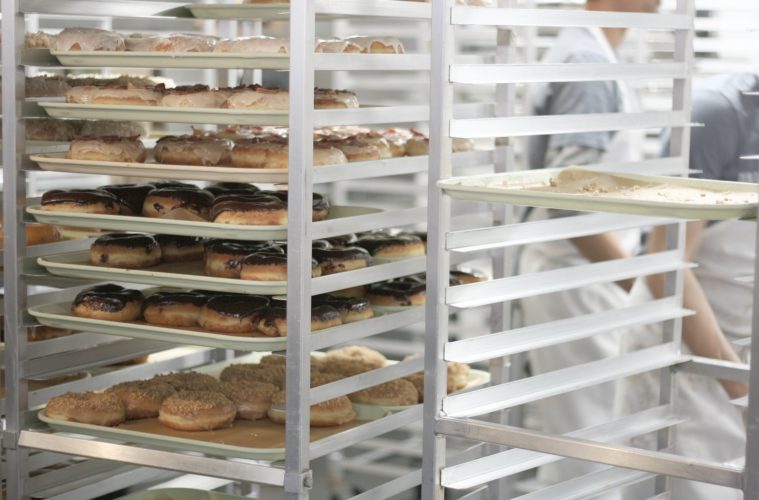Few scents are as tantalising and welcoming as the aroma of freshly baked goods. The warm, comforting smells of bread, pastries, and cakes wafting through a bakery are enough to make anyone’s mouth water. However, behind this seemingly simple and blissful scene lies a world of carefully chosen equipment and meticulous organisation.
Naturally, starting a bakery requires a significant amount of effort and planning, with one crucial aspect being the selection and maintenance of racks. These essential pieces of equipment not only hold your baked goods but also play a vital role in ensuring efficient workflow and product quality.
Main Types of Bakery Racks

When you’re trying to select stable and durable bakery racks for your business, you need to take a peek at the plethora of options available. Some have wheels, some come with trays, and some are made specifically for storing cans. So, let’s take a quick look at the main types you might encounter:
Speed Racks
As the name suggests, speed racks are all about efficiency. With multiple levels and plenty of space, they allow for easy access to ingredients and tools needed for quick assembly and baking. Their open design also promotes good airflow, which is crucial in a busy bakery where time is of the essence.
When you position these racks near your workstations, you can move around faster and keep things running smoothly. You can use them to store prepped ingredients, cooling baked goods, or even as temporary resting spots for hot trays.
Bun Pan Racks
These are a staple in any bakery, with their sturdy frame and spacious shelves perfect for holding sheet pans. Their inherent mobility is also a plus, allowing you to move entire batches of goods without fuss. They come with minimalist designs, so they won’t take up much space, and they are easy to clean as well.
Given their larger size, bun pan racks are suitable for storing baked goods that need to cool down or be transported without losing their shape or texture. They also make it easier to organise your baking process and keep track of what’s done and what’s left to do.
Dough Box Racks
For those who are into artisanal bread making or handling large quantities of dough, having dedicated dough box bakery racks is essential. They’re designed to perfectly fit standard dough boxes, allowing for easy and efficient storage of multiple batches of dough. Their sturdy construction also ensures that the dough stays in place, preventing any unnecessary messes.
They also often come with a bottom shelf that can hold trays or other necessary equipment, making it even more convenient to have everything within arm’s reach. When you need to focus on shaping and baking your dough, having a dedicated rack for proofing can help streamline your work process.
Can Racks
This bakery trolley is perfect for storing canned goods, saving you valuable shelf space and making it easier to keep track of your inventory. It comes in various shapes and sizes, making it easy to find one that fits your needs and available storage space.
Can racks are also useful when you need to transport canned ingredients from one workstation to another without having to carry them by hand. They’re incredibly sturdy, so you won’t have to worry about the weight of the cans causing any damage or bending the shelves.
Major Considerations When Choosing Bakery Racks

Now that we’ve covered the main types of bakery trolleys, it’s time to discuss what factors you should consider when making your final decision. Naturally, not all of them offer the same features or suit every bakery’s needs.
Material and Build Quality
First and foremost, you’ll want to make sure that the racks you choose are made from high-quality, food-grade materials. Stainless steel is a popular and durable option, as it’s easy to clean and resistant to rust and corrosion. However, some racks come in plastic or aluminium options, which can be more budget-friendly but may not withstand heavy use.
Size and Capacity
The size of your bakery and the volume of baked goods you produce will significantly impact the size and capacity of racks you need. It’s essential to measure your available space and consider how many trays or ingredients each rack can hold. You may also want to think about future growth and whether you’ll need to expand your storage in the near future.
Consider the kind of baked goods you make and how many of each type you typically have on hand. This will help determine the size and number of racks you need, as well as their weight-bearing capacity. If you need to store heavy trays or a large number of ingredients, opt for racks that can support the weight without bending or toppling over.
Mobility and Ease of Use
In a busy bakery, you’ll want your equipment to be as mobile and efficient as possible. Look for racks with wheels that can easily move around even when fully loaded. Some may come with locking mechanisms to prevent them from rolling away when not in use.
You should also consider the design of the racks and how easy it is to access your goods. Racks with open shelves or adjustable heights can make it easier to reach what you need without having to move things around too much.
Cleaning and Maintenance
Finally, maintaining hygiene and cleanliness in a bakery is crucial for food safety. That’s why it’s essential to choose racks that are easy to clean and maintain. Stainless steel racks are the most convenient in this regard, as they don’t retain any food particles or odours, and can be wiped down quickly.
Plastic or aluminium racks may require more frequent cleaning to prevent bacteria growth, so make sure you have a plan in place for regularly sanitising them. Additionally, check if the racks have removable shelves or trays for deep cleaning and sanitation.


